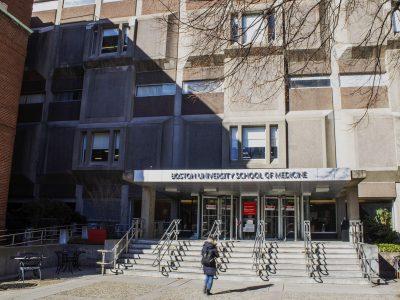Alzheimer’s disease, a type of dementia, is a neurological disorder affecting an individual’s memory, behavior and cognitive abilities. An estimated 13.8 million people over the age of 65 will have the disease by 2050, according to a 2020 report by the Alzheimer’s Association.

The Boston University Alzheimer’s Disease Research Center aims to decrease “the human and economic costs” of the disease by conducting research to better understand the disorder, according to the website.
Andrew Budson is the associate director for research at the BU Alzheimer’s Disease Center. He said, above all else, the goal of the center is to find more effective treatment options for those diagnosed with Alzheimer’s and eventually find a cure so patients “don’t have to suffer with this disease anymore.”
Budson said the center isn’t focused on one particular research project at a time — instead, researchers follow their own paths with topics of their choice.
“There are all sorts of different studies that are going on, but the common thread is that they all involve participants that are recruited to our center, and the core participants are seen every year,” he said. “We call it the HOPE study, which stands for Health Outreach Program for the Elderly.”
The HOPE study involves a “neurological exam and pencil and paper testing every year,” Budson said, as well as occasional additional tests such as MRI scans.
Budson also described some of his current research with the center that focuses on testing whether Alzheimer’s patients were experiencing false memories — when people misremember certain memories or recall events that had never happened.
“What we found in that study was that false memories were almost equally as common as forgetting,” he said. “People have mainly concentrated on forgetting, but it turns out these false memories are just about as large a problem. So that was a novel finding.”
Another study Budson discussed was done in conjunction with Maureen O’Connor, a neuropsychologist and the director of the Research Education Component at the ADC.
Budson and O’Connor wrote the book “Seven Steps to Managing Your Memory: What’s Normal, What’s Not, And What to Do About it,” published in 2017, which Budson said is for aging adults who may be wondering if they are developing Alzheimer’s.
O’Connor said she is currently working on a project in partnership between BU and New York University studying couples in which only one individual has dementia and how they are affected by the disease.
“We’re trying to understand how the dynamics of the relationship that may have pre-existed might contribute to how the couple manages the disease,” O’Connor said, “and whether there are factors that we can identify that help some couples to more successfully manage the disease together, and other couples to be less successful doing that.”
O’Connor also said luckily, the pandemic has not affected her research too much given that their work has been mostly administrative, such as organizing paperwork and setting up an ethics review board for the study.
However, the project will soon enter the “participant recruitment stage,” she said, which will look different because of restrictions imposed by the pandemic.
“That’s going to look different during COVID, and we’ll see how COVID impacts our ability to recruit participants into the study,” O’Connor said. “But we have quickly shifted the whole study so that our data collection is over video.”
Michael Alosco, associate professor of neurology, received a postdoctoral fellowship at the center in 2015. In addition to being lead investigator at BU’s Chronic Traumatic Encephalopathy Center, he is also a clinical core co-leader at the Alzheimer’s Disease Research Center.
His most recent research includes detecting Alzheimer’s with new techniques by testing blood drawn using “blood-based biomarkers.”
“We can actually now analyze that blood and analyze it for proteins associated with Alzheimer’s disease,” Alosco said. “We’ve been publishing different studies that show that some of these proteins might be quite good for picking up on some of the impairment due to Alzheimer’s disease.”
Alosco also said the center has been a great resource, not just for Bostonians, but for national and international scientific communities as well.
“It’s really a great way to facilitate research,” he said. “It’s also a great way to get participants into clinical trials to test drug treatments. And so it’s really quite an incredible resource, not only here, but for investigators across the world.”


























































































































